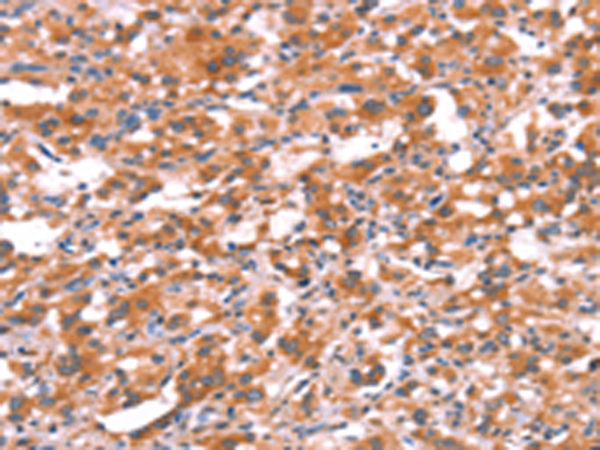

| WB | 1/1000-1/2000 | Human,Mouse,Rat |
| IF | 咨询技术 | Human,Mouse,Rat |
| IHC | 咨询技术 | Human,Mouse,Rat |
| ICC | 1/50-1/200 | Human,Mouse,Rat |
| FCM | 咨询技术 | Human,Mouse,Rat |
| Elisa | 咨询技术 | Human,Mouse,Rat |
| Aliases | CAE2; ECA2; GEFSP3 |
| WB Predicted band size | 54 kDa |
| Host/Isotype | Rabbit IgG |
| Antibody Type | Primary antibody |
| Storage | Store at 4°C short term. Aliquot and store at -20°C long term. Avoid freeze/thaw cycles. |
| Species Reactivity | Human, Mouse, Rat |
| Immunogen | Synthetic peptide of human GABRG2 |
| Formulation | Purified antibody in PBS with 0.05% sodium azide and 50% glycerol. |
+ +
以下是3-4篇关于ANGPTL3抗体的代表性文献及摘要概括:
---
1. **文献名称**: *ANGPTL3 Inhibition with Evinacumab in Patients with Refractory Hypercholesterolemia*
**作者**: Raal FJ, et al.
**摘要**: 该研究发表于《新英格兰医学杂志》(NEJM),报道了单克隆抗体Evinacumab(靶向ANGPTL3)在难治性高胆固醇血症患者中的临床试验。结果显示,每月一次静脉注射Evinacumab可显著降低低密度脂蛋白胆固醇(LDL-C)水平(平均降低49%),且耐受性良好,为家族性高胆固醇血症患者提供了新疗法。
---
2. **文献名称**: *Antibody-mediated inhibition of ANGPTL3 reduces serum lipids in rodents and primates*
**作者**: Gusarova V, et al.
**摘要**: 本研究(《Nature Metabolism》)通过动物实验证明,抗ANGPTL3抗体可有效抑制ANGPTL3功能,降低小鼠和非人灵长类动物的甘油三酯(TG)和LDL-C水平,同时增加脂蛋白脂肪酶(LPL)活性,验证了ANGPTL3作为血脂调节靶点的潜力。
---
3. **文献名称**: *ANGPTL3 as a therapeutic target in metabolic and cardiovascular diseases*
**作者**: Dewey FE, et al.
**摘要**: 这篇综述(《Circulation Research》)总结了ANGPTL3在脂代谢中的核心作用及其抗体药物的开发进展。重点讨论了遗传学证据(如ANGPTL3功能缺失突变与低心血管风险相关)和临床前研究,支持靶向ANGPTL3抗体在治疗动脉粥样硬化及代谢综合征中的应用。
---
4. **文献名称**: *Evinacumab: Mechanism of action and clinical efficacy in homozygous familial hypercholesterolemia*
**作者**: Rosenson RS, et al.
**摘要**: 该文献(《Atherosclerosis》)详细解析了Evinacumab的作用机制(通过阻断ANGPTL3抑制VLDL和LDL代谢),并汇总了III期临床试验数据,显示其在纯合子家族性高胆固醇血症(HoFH)患者中降低LDL-C达47%,突破了传统降脂疗法的局限性。
---
**注**:以上文献均聚焦于ANGPTL3抗体的作用机制、临床前研究及转化应用,其中Evinacumab为目前唯一获批的ANGPTL3靶向药物。如需具体文献链接或补充年份,可进一步提供信息。
ANGPTL3 (angiopoietin-like protein 3) is a liver-secreted glycoprotein that regulates lipid metabolism by inhibiting lipoprotein lipase (LPL) and endothelial lipase (EL), enzymes critical for triglyceride hydrolysis and HDL metabolism. Loss-of-function mutations in *ANGPTL3* are associated with reduced plasma triglycerides, LDL-C, and HDL-C, linking it to cardiovascular disease risk. This discovery positioned ANGPTL3 as a therapeutic target for dyslipidemia and atherosclerotic diseases.
Monoclonal antibodies targeting ANGPTL3. such as evinacumab, were developed to mimic these beneficial genetic effects. Evinacumab, a fully human IgG4 antibody, binds ANGPTL3 with high specificity, blocking its interaction with LPL/EL and restoring lipid-processing activity. Clinical trials demonstrate its efficacy in lowering LDL-C by up to 50% and triglycerides by 76% in patients with refractory hypercholesterolemia, including homozygous familial hypercholesterolemia (HoFH). In 2021. evinacumab gained FDA/EMA approval for HoFH treatment, marking a breakthrough for patients unresponsive to conventional lipid-lowering therapies.
Research continues to explore ANGPTL3 inhibition in broader populations, including heterozygous FH and severe hypertriglyceridemia. Potential risks include elevated liver enzymes and theoretical concerns about pancreatitis due to extreme triglyceride reduction. As an LDL-C-independent mechanism, ANGPTL3 antibodies complement statins and PCSK9 inhibitors, offering a novel approach for managing residual cardiovascular risk. Ongoing studies aim to clarify long-term safety and cardiovascular outcomes.
×